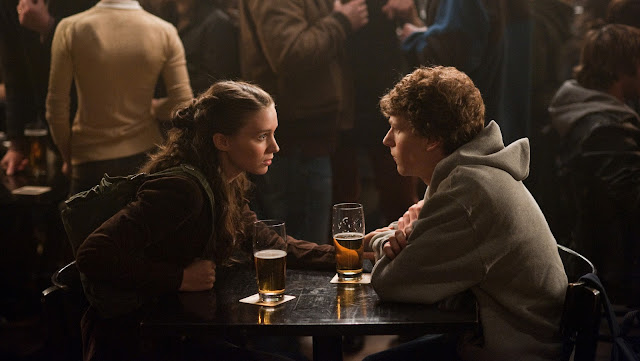Review: The Social Network (2010)
I couldn’t help but feel a little sad as the credits for The Social Network rolled. Mark Zuckerberg (Jesse Eisenberg) sits at his laptop, repeatedly refreshing his ex-girlfriend’s Facebook page in the hopes that she has accepted his friend request. He’s completely alone. His defense team has gone home for the day, but he stays behind, asking one of his lawyers (Rashida Jones), “do you think anybody would mind if I stayed and used the computer for a minute?” It’s a lonely, uncomfortable, corporate scene.
What is a friend today? The people whose Instagram photos we comment on? Our Twitter followers? A Facebook ‘friend’? I’m being cynical, but director David Fincher’s film makes it clear that in America’s individualist culture and free-market economy, friendship isn’t a necessary ingredient in the recipe for success. In fact, every relationship becomes transactional.
Transactional relationships exist throughout The Social Network and not solely online. Mark and his alleged best friend, Eduardo Severin (Andrew Garfield), are obsessed with getting into one of Harvard’s prestigious final clubs. These fraternity-like organizations will provide them social clout and personal validation, as well as the connections they believe they need to succeed. They might make some friends along the way, but is that more important than girls thinking they’re cool because Eduardo’s in the Phoenix club? Aaron Sorkin’s script uses the final clubs to establish Eduardo and Mark’s rivalry, a key component of their relationship. Mark is jealous when Eduardo gets “punched by the Phoenix.” His friend’s acceptance into the school’s social scene while he codes alone in his room is something he never gets over.
From final clubs to Harvard-specific social networks to the Winklevoss twins’ (Armie Hammer) inner circle, the only way to gain entrance into these success-driven, competitive worlds is to offer something of value. The ‘Winklevi’ want to work with Mark because he knows how to code. Christy (Brenda Song), a fellow undergraduate, and her friend are only interested in Mark and Eduardo after they invent Facebook. We are led to believe Eduardo’s invite to join the Phoenix is due to his financial privilege; he frequently mentions his overbearing father and is somehow able to fund Mark’s increasingly expensive ideas. Fincher offers a depressing window into the artificial relationships that flourish in a society that prioritizes success above all else.
Beyond its bleak view of friendship under capitalism, Fincher’s film offers an eerie advance warning about the pitfalls of social media. The Social Network paints a world where everyone’s your best friend, where everyone’s constant online presence offers a way for you to make money via the “like.” Remember how happy Mark was when his Facemash site caused the Harvard internet to crash? You might have to sell your soul along the way, but it’ll all be worth it when you’re the world’s youngest billionaire. It’s significant that this film came out in 2010. Instagram launched the same year, and social media was still in its infancy. Facebook wasn’t the Big Brother-like institution then as it is today; no one could predict what was to come, but the film was far-sighted in its read of Mark Zuckerberg.
Fincher structures his film around interpersonal relationships that aren’t relationships at all. They are business deals gone awry, forcing characters into depositions, lawsuits, and disappointment. In fact, they are much like virtual relationships – deeply profitable and, ultimately, shallow. When his girlfriend, Erica (Rooney Mara), breaks up with him in the film’s opening scene, their conversation reads like a business deal. Mark pines after Erica throughout the film, but regardless of whether she wants to get back together with him, didn’t he win in the end? As fictional as Erica is, she might not be his ‘friend,’ but she’s one of his now nearly 3 billion users worldwide.



Comments
Post a Comment